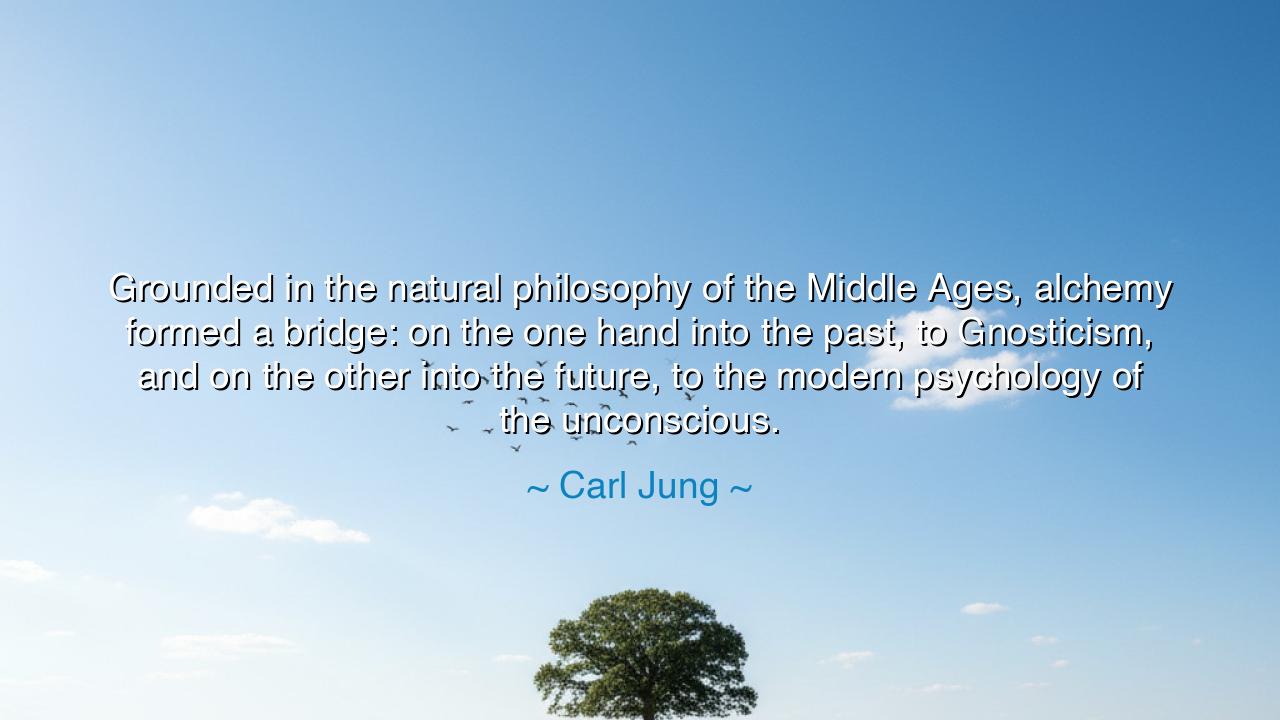
Grounded in the natural philosophy of the Middle Ages, alchemy
Grounded in the natural philosophy of the Middle Ages, alchemy formed a bridge: on the one hand into the past, to Gnosticism, and on the other into the future, to the modern psychology of the unconscious.






"Grounded in the natural philosophy of the Middle Ages, alchemy formed a bridge: on the one hand into the past, to Gnosticism, and on the other into the future, to the modern psychology of the unconscious." These words by Carl Jung invite us to reflect on the deep, timeless relationship between the mysteries of the mind, spirit, and matter. Jung’s view on alchemy is not merely about the ancient art of turning base metals into gold; it is a symbolic journey into the depths of human consciousness. Alchemy, in its truest sense, is not just about transforming materials, but about transforming the soul—a process that connects the wisdom of the past with the insights of the modern world.
The alchemy of the Middle Ages was grounded in the idea of transmutation—that through a deep understanding of the natural world and the elements, one could transform and elevate the human spirit. Alchemists saw the process of turning lead into gold as a metaphor for inner spiritual growth—moving from a base, corruptible state to something pure and immortal. The ancient Egyptians, with their profound connection to the mysteries of the universe, believed that transformation could lead to eternal life. For them, alchemy was a sacred science that bridged the material world with the spiritual realm, showing that the path to enlightenment was found in understanding both the physical and mystical worlds.
In Jung’s view, alchemy is a bridge between Gnosticism—the belief in a hidden, esoteric knowledge that transcends the physical world—and the burgeoning field of modern psychology. Gnosticism, which flourished in the early centuries of the Common Era, placed great emphasis on the inner spiritual journey and the search for hidden wisdom. Like the alchemists, the Gnostics sought to uncover the deeper truths of existence, believing that knowledge and enlightenment were paths to spiritual liberation. Jung saw alchemy as a powerful symbolic system that connected the ancient, mystical wisdom of the Gnostics with the modern psychological quest for understanding the unconscious mind.
Jung’s own work in psychology, particularly his exploration of the unconscious, can be seen as an extension of alchemy’s transformational process. Just as alchemists used symbols and rituals to unlock the mysteries of nature, Jung used the language of symbols—dreams, archetypes, and myths—to understand the depths of the human psyche. He believed that the unconscious mind was filled with hidden potentials, much like the alchemists believed the material world was filled with hidden treasures. In a sense, Jung viewed the process of individuation, the journey of becoming one’s true self, as a modern alchemy—a process of psychic transformation akin to the alchemist’s journey of turning base metals into gold.
Consider the story of Paracelsus, one of the most famous alchemists of the Renaissance. Paracelsus was not just a practitioner of alchemy in the material sense, but also a physician who explored the relationship between the mind and body. He believed that the secrets of healing lay in understanding the spiritual and psychological aspects of illness, not just the physical. His work is an example of the alchemy of the mind, where the transformation of one’s consciousness could lead to physical and emotional healing. In much the same way, Jung saw the path to wholeness and enlightenment as one that required understanding the unconscious forces at play within us.
The lesson in Jung’s words is that growth and transformation are not just about the external world; they are deeply rooted in the inner, mystical world of the self. Alchemy, whether in the medieval sense or in the context of Jungian psychology, is a metaphor for the journey of the soul, the mind, and the spirit. Just as the alchemists sought to transmute the elements, we too must learn to transform our inner world—our thoughts, beliefs, and emotions—to reach a higher state of being. This transformation is not immediate, nor is it easy, but it is a process that takes patience, self-reflection, and dedication.
In practical terms, we can apply this wisdom by embracing the symbolic language of transformation in our own lives. When faced with challenges, rather than seeing them as obstacles, we can view them as opportunities for inner alchemy—moments that invite us to refine our character, to heal our wounds, and to emerge stronger and wiser. Just as the alchemists saw the potential for gold in the base metals of the earth, we too can find the potential for growth and enlightenment within the difficulties we face. Each challenge, each moment of reflection, is part of the process of transformation that leads us toward a more complete and authentic self.
In closing, let us remember that alchemy, as Jung saw it, is not just about turning lead into gold or seeking hidden knowledge. It is about transforming ourselves—through understanding, reflection, and the pursuit of wisdom. The journey of life is a process of transmutation, where we turn our fears into courage, our doubts into confidence, and our struggles into strength. Just as the alchemists of old sought to understand the world through symbols and transformations, we too can use the symbols in our own lives to understand and shape our journey of personal growth and spiritual awakening. Let us embrace the wisdom of the ancients, and through self-reflection and psychic transformation, we can unlock the hidden treasures of the human soul.






AAdministratorAdministrator
Welcome, honored guests. Please leave a comment, we will respond soon